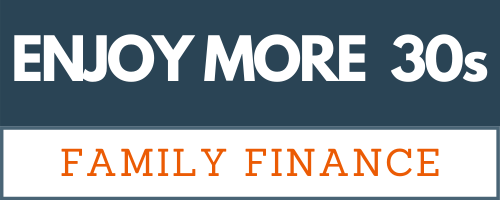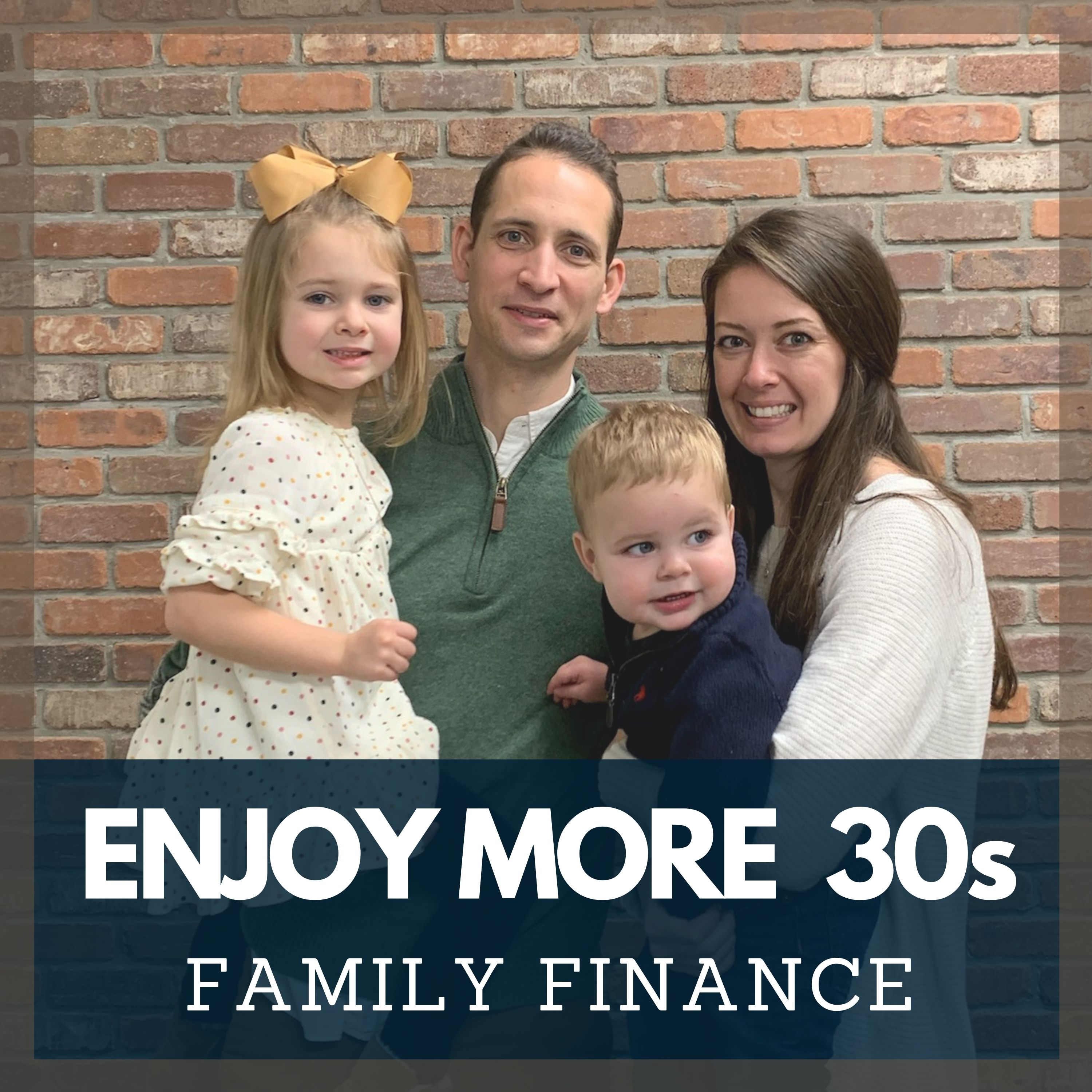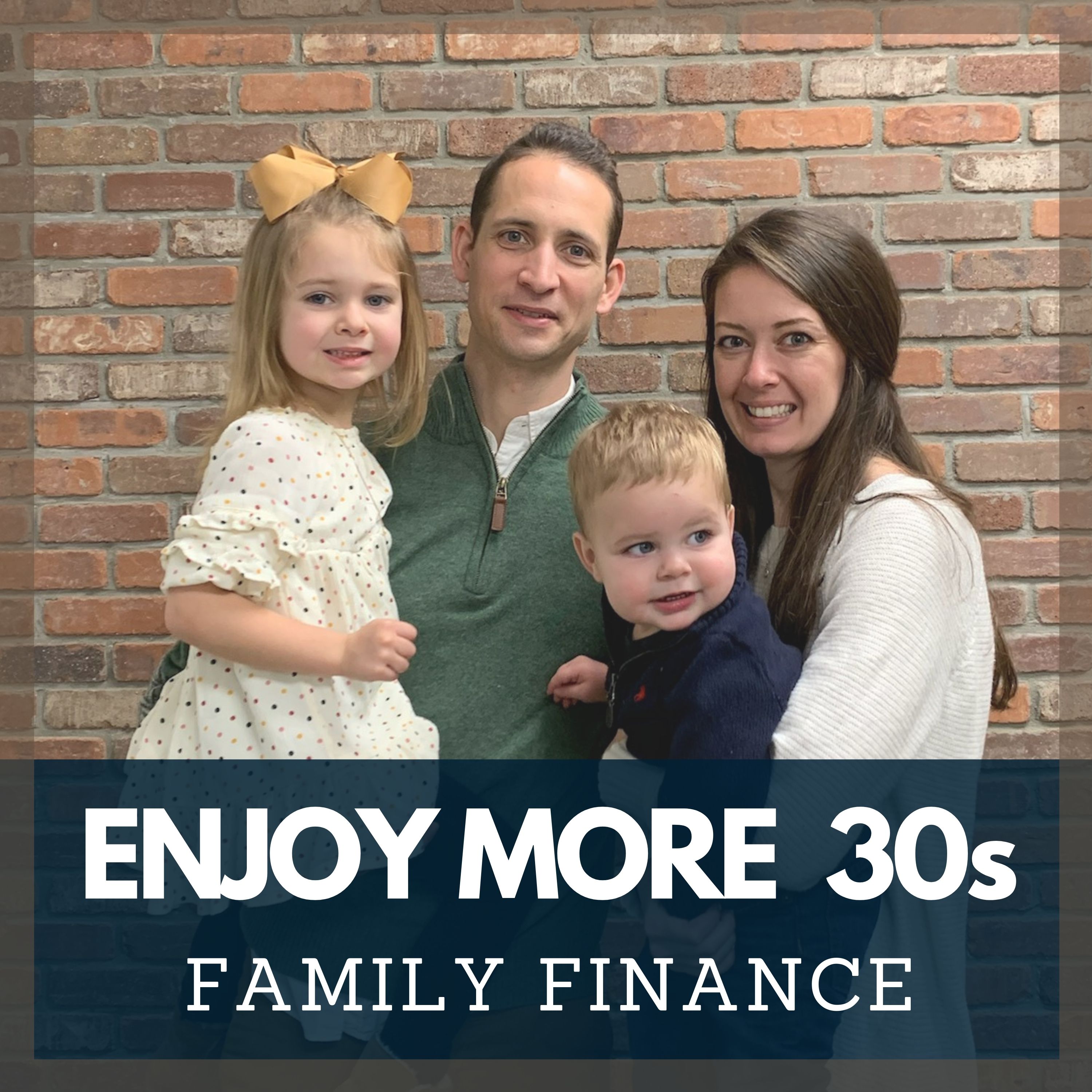Episode 4
36%: The Golden Cash Flow Ratio | Series 2.4
Stop wasting countless hours budgeting - find out how much additional you may be able to save in 15 minutes or less.
- The goal of a budgeting exercise (01:23)
- 36% ratio: see where you stand (02:08)
- Do something with your extra savings (06:43)
Quote for the episode: "The goal is not to account for every penny. It is to make sure you're saving a good amount towards yourself and keeping within your means."
Securities offered through TFS Securities, Inc., Advisory Services through TFS Advisory Services, a SEC Registered Investment Advisor Member FINRA / SIPC. TFS Securities, Inc. located at 437 Newman Springs Road, Lincroft, NJ 07738 (732) 758-9300.
Transcript
Welcome to the Enjoy More 30s: Family Finance
Voiceover Audio:podcast, the only podcast dedicated to making life more
Voiceover Audio:enjoyable for young families by hitting on the financial topics
Voiceover Audio:that tend to weigh on us, stress us out and distract our focus
Voiceover Audio:from simply enjoying life.
Joseph Okaly:Welcome to the fourth episode in this "Your
Joseph Okaly:Money Multiplier" series, which is entitled "36%: The Golden
Joseph Okaly:Cash Flow Ratio". Today we're going to cover what you need to
Joseph Okaly:know when it comes to what a budgeting exercise should
Joseph Okaly:actually accomplish. And what you can do to perform your own
Joseph Okaly:in 15 minutes or less. Growing up, I was always a bit of a slim
Joseph Okaly:kid. And so when I got into high school with sports, and you
Joseph Okaly:know, just being honest, girls and everything else, I wanted to
Joseph Okaly:be bigger, more muscular like a lot of boys do. You would hear
Joseph Okaly:talk of eating this special diet or taking the supplement or
Joseph Okaly:whatever else. It was always a lot of work, took a lot of time,
Joseph Okaly:and at the end of the day was not sustainable long term. This
Joseph Okaly:is kind of how it is for anyone that has ever tried, you know, a
Joseph Okaly:diet or anything kind of in this realm. Most are too time
Joseph Okaly:consuming and complicated to maintain long term. At the end
Joseph Okaly:of the day, pretty much everyone can agree on a quick, simple,
Joseph Okaly:universal version. If you put lots of good stuff into your
Joseph Okaly:body, put as little bad stuff into your body as possible, and
Joseph Okaly:work out to some degree, you'll probably be in pretty good
Joseph Okaly:shape.
Joseph Okaly:What you need to know is that scary words like budgeting and
Joseph Okaly:cash flow work much the same way. The most logical way to
Joseph Okaly:approach it is to break down everything you have coming in,
Joseph Okaly:what you have going out, being meticulous down to the very
Joseph Okaly:penny. And the end result is that there's way too much work
Joseph Okaly:to maintain- every month is different. And then Christmas
Joseph Okaly:and a sick dog bill just kind of blow the whole thing up anyway.
Joseph Okaly:I'm here to tell you, though, that you don't need to do it
Joseph Okaly:this way. And maybe surprising to hear, but the goal is to not
Joseph Okaly:actually account for every penny when it comes to a budgeting
Joseph Okaly:exercise. It's to make sure you're living within your means
Joseph Okaly:and saving at least something towards yourself every month.
Joseph Okaly:What you can do to accomplish this is to utilize a 36% ratio.
Joseph Okaly:This is the same ratio that is incorporated into how a bank
Joseph Okaly:evaluates you for a mortgage. Our trademark tool, that we call
Joseph Okaly:Backdoor Budgeting, uses this same approach that we use in
Joseph Okaly:meetings with clients. So how it works is kind of like this. If
Joseph Okaly:you were to apply for a loan at a bank, they would focus on just
Joseph Okaly:36% of your gross, so pre tax, monthly income. The other 64%
Joseph Okaly:they would pretty much just ignore. They say that this is
Joseph Okaly:the portion of your income that goes to expenses everyone has.
Joseph Okaly:So think groceries, gas, cell phone, TV, stuff like that. For
Joseph Okaly:the 36%, they would focus on just the items that are specific
Joseph Okaly:to you- meaning some people have them and some people don't. Some
Joseph Okaly:people have a car loan, some people don't. Some people have a
Joseph Okaly:mortgage, some people rent, some people save into a work plan and
Joseph Okaly:some people don't. So basically, it includes your housing
Joseph Okaly:payment, mortgage with taxes and insurance or rent, loans and
Joseph Okaly:debts, think auto, student, or any credit cards that you carry
Joseph Okaly:forward month to month with partial payments, so if you
Joseph Okaly:don't pay your credit cards off every month, and then what you
Joseph Okaly:already save every month.
Joseph Okaly:So let me give you kind of a simplified example. If I make
Joseph Okaly:say $10,000 a month gross, so again, before taxes. Then 36%
Joseph Okaly:comes out to 3,600- 36% of 10,000 is 3,600. Pretty easy so
Joseph Okaly:far. This is the amount we're focusing on for 'specific to me'
Joseph Okaly:expenses. If I have a mortgage of $1,600 a month, and a car
Joseph Okaly:loan of $500 a month, I subtract those and now I'm down to $1,500
Joseph Okaly:a month- $3,600 minus $1,600 for the mortgage is $2,000. $2,000
Joseph Okaly:minus the $500 for the car loan is $1,500. Not too bad still
Joseph Okaly:right? If I save around $1,000 a month into my 401(k) already at
Joseph Okaly:work, now I take that $1,500, subtract that another $1,000 and
Joseph Okaly:I'm down to $500. So with no other loans, or unpaid credit
Joseph Okaly:cards that carry month to month, this is what I should have as a
Joseph Okaly:surplus. There it is. Done. You have a starting point. That took
Joseph Okaly:way less than 15 minutes actually.
Joseph Okaly:This can be used for a flexible investment account as described
Joseph Okaly:in the earlier "Like Super Gymnast Flexible" episode. It
Joseph Okaly:can be used for college savings, for a home improvement, or
Joseph Okaly:another home purchase account, for more retirement savings-
Joseph Okaly:anything. You now have a starting point. If you find this
Joseph Okaly:is too high or too low, you can just change it the next month,
Joseph Okaly:no problem. The hardest part, though, is now done for you. You
Joseph Okaly:have a starting point of what most people, most families in
Joseph Okaly:your situation, using that standard ratio, should be able
Joseph Okaly:to save additional. If the number comes out negative when
Joseph Okaly:you do this exercise, then I would not be surprised to hear
Joseph Okaly:that you have growing credit card balances and trouble paying
Joseph Okaly:everything month to month. This is your likely deficit that
Joseph Okaly:probably needs attention in that case. Now, you know, on this
Joseph Okaly:other hand, roughly how much you need to free up by lowering your
Joseph Okaly:savings, maybe refinancing. These parts may need an advisor
Joseph Okaly:to maybe give you the best course of approach for, but
Joseph Okaly:either way in way less than 15 minutes, you have a great idea
Joseph Okaly:of where you stand. It was quick, painless, and puts you in
Joseph Okaly:a position that you can take positive action. That's the most
Joseph Okaly:important part of all of this.
Joseph Okaly:So when we're talking about budgeting, you know, as kind of
Joseph Okaly:a recap for today, the first thing is to rethink the goal of
Joseph Okaly:scary words like budgeting. The goal is not to account for every
Joseph Okaly:penny, it is to make sure you're saving a good amount towards
Joseph Okaly:yourself and keeping within your means. That's it. Second, use
Joseph Okaly:this 36% ratio to quickly get an idea of where you stand. Gross,
Joseph Okaly:so pre tax income, minus those expenses that are specific to
Joseph Okaly:you, and any savings currently being done, and you're done with
Joseph Okaly:calculating a starting point. Third, take action. Make a
Joseph Okaly:conscious choice to now do something with that extra
Joseph Okaly:savings. Even if it's just, "I'm going to move it into this
Joseph Okaly:separate bank account every month to see if I can actually
Joseph Okaly:do this", even that is fine. Make some positive step forward
Joseph Okaly:as a first step. And if you're on the negative side, make sure
Joseph Okaly:to look at taking action to balance out your cash flow. If
Joseph Okaly:you have rising credit cards every month, decreasing bank
Joseph Okaly:account every month, that needs attention now. It is not going
Joseph Okaly:to fix itself, it will only get worse. It's never smart to save
Joseph Okaly:at the expense of mounting credit card debt. It's kind of
Joseph Okaly:like you know swimming backwards, so to speak. Put
Joseph Okaly:money into my 401(k) but I'm putting an equal amount onto my
Joseph Okaly:credit card because I can't live, that equation isn't going
Joseph Okaly:to balance out for you long term.
Joseph Okaly:So as always, if you are wanting help, please remember to check
Joseph Okaly:out the 'Ask Joe' section on the show's website- enjoy more 30s
Joseph Okaly:.com, that's enjoy more three zero s .com and thanks very much
Joseph Okaly:for tuning in today. Please remember if you enjoyed this
Joseph Okaly:episode, please make sure to subscribe and review us on Apple
Joseph Okaly:podcasts or wherever you listen. There are literally millions of
Joseph Okaly:young American families out there I'm trying to reach and
Joseph Okaly:help just like you. Clicking on a star, leaving a review,
Joseph Okaly:clicking subscribe- all of these things help us show up higher in
Joseph Okaly:the rankings and give more people like you an opportunity
Joseph Okaly:to find it, and hopefully help them in the ways that it's
Joseph Okaly:helping you. The next episode is titled "Stocks Lead, Don't
Joseph Okaly:Follow" where we will cover what typically makes the stock market
Joseph Okaly:react and the mistakes most investors make after the fact by
Joseph Okaly:trying to follow along. Thanks very much as always for
Joseph Okaly:connecting today and looking forward to doing so again soon.
Voiceover Audio:The conversations on this show are
Voiceover Audio:Joe's opinions and provided for general information purposes
Voiceover Audio:only. They do not constitute accounting, legal tax or other
Voiceover Audio:professional advice for your specific situation. You should
Voiceover Audio:always seek appropriate advice from a financial advisor,
Voiceover Audio:accountant, lawyer or other professional before acting upon
Voiceover Audio:any content or information found here first. Joe is affiliated
Voiceover Audio:with New Horizons Wealth Management LLC, a branch office
Voiceover Audio:of TFS securities Inc and TFS advisory services and sec
Voiceover Audio:registered investment advisor member FINRA/SIPC.


